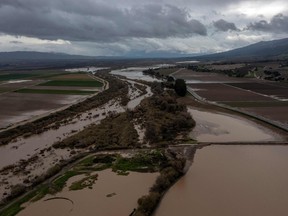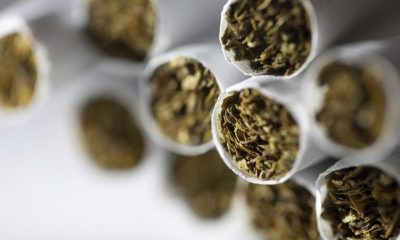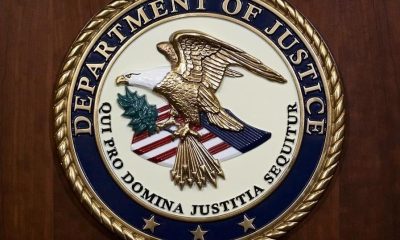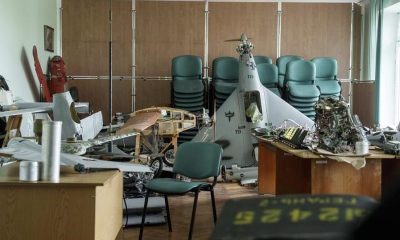Politics
Philip Steenkamp: Food security should be next on B.C.’s political menu

We got a taste of food insecurity early in the pandemic as grocery-store shelves emptied. The race for the last package of toilet paper or bottle of hand sanitizer got the headlines, but even the availability of household staples like flour and eggs was suddenly in doubt.
Then, just as that was settling down, the November 2021 atmospheric river swept in. Floodwaters overtook huge swaths of Fraser Valley farmland, and drowned cows, chickens, pigs and even bees by the thousands. Landslides and bridge collapses cut off trucking routes and rail lines — and once again, supermarket shelves emptied out.
Today, in the aftermath of an even more devastating atmospheric river and widespread flooding in California — the source of a lot of B.C. produce, especially in the winter and spring — questions are arising of where the next shortages will show up. Even at that, our situation pales in comparison to developing countries that until now relied on wheat from Ukraine. Russia has not only blockaded exports from that country, but is also launching relentless attacks on the energy infrastructure that helps keep food production running.
That may be disheartening to hear, given the many other dangers and challenges we’re facing, but then those crises have more than a little connection to a safe, reliable, affordable supply of food. Climate disruption means more extreme weather events; rising authoritarianism and nationalism threaten to unleash more wars; our global economy, built on assumptions about stability that today seem hopelessly naïve, can be expected to falter again and again.
All of these conditions erode the security of our food supply.
In turn, an insecure supply of food can undermine the stability of governments and local economies, prompt large-scale migrations and humanitarian crises, and heighten conflicts between countries.

Addressing food security requires a broad range of co-ordinated responses at every level, from individual neighbourhoods to international co-operation. We urgently need to have long-overdue conversations about just what that response must look like.
But not all the answers will have to be planetary in scale — or even provincewide.
As you read this, the Giving Garden in the Farm at Royal Roads University is nearly ready for the first harvest of 2023. Driven by Dr. Hilary Leighton, program head in our School of Environment and Sustainability, it is both a living laboratory for Royal Roads students and a growing source of fresh produce for the Greater Victoria community, directly addressing food insecurity in the region.
Meanwhile, Dr. Robert Newell, the new Canada Research Chair in Climate Change, Biodiversity and Sustainability, is studying the use of systems mapping to show relationships among local farms, transportation networks, grocery stores, communities and key social and environmental issues. His program also looks at sustainability and novel food production methods, such as vertical agriculture (growing crops indoors using stacked shelves) and cellular agriculture (growing meat directly from cell cultures instead of relying on animals).
That can only happen if leaders at all levels start convening the public conversations needed to shape that vision.
If any good is to come from the food supply shocks of the past three years — and the more severe incidents that are sure to come — it’s that they’ve given us all an appetite for those conversations. It’s time for our leaders to get cooking.

Politics
Saskatchewan Party’s Moe pledges change room ban in schools; Beck calls it desperate

REGINA – Saskatchewan Party Leader Scott Moe is promising a directive banning “biological boys” from using school changing rooms with “biological girls” if re-elected, a move the NDP’s Carla Beck says weaponizes vulnerable kids.
Moe made the pledge Thursday at a campaign stop in Regina. He said it was in response to a complaint that two biological males had changed for gym class with girls at a school in southeast Saskatchewan.
He said the ban would be his first order of business if he’s voted again as premier on Oct. 28.
It was not previously included in his party’s campaign platform document.
“I’ll be very clear, there will be a directive that would come from the minister of education that would say that biological boys will not be in the change room with biological girls,” Moe said.
He added school divisions should already have change room policies, but a provincial directive would ensure all have the rule in place.
Asked about the rights of gender-diverse youth, Moe said other children also have rights.
“What about the rights of all the other girls that are changing in that very change room? They have rights as well,” he said, followed by cheers and claps.
The complaint was made at a school with the Prairie Valley School Division. The division said in a statement it doesn’t comment on specific situations that could jeopardize student privacy and safety.
“We believe all students should have the opportunity to learn and grow in a safe and welcoming learning environment,” it said.
“Our policies and procedures align with the Canadian Charter of Rights and Freedoms, the Canadian Human Rights Act and the Saskatchewan Human Rights Code.”
Asked about Moe’s proposal, Beck said it would make vulnerable kids more vulnerable.
Moe is desperate to stoke fear and division after having a bad night during Wednesday’s televised leaders’ debate, she said.
“Saskatchewan people, when we’re at our best, are people that come together and deliver results, not divisive, ugly politics like we’ve seen time and again from Scott Moe and the Sask. Party,” Beck said.
“If you see leaders holding so much power choosing to punch down on vulnerable kids, that tells you everything you need to know about them.”
Beck said voters have more pressing education issues on their minds, including the need for smaller classrooms, more teaching staff and increased supports for students.
People also want better health care and to be able to afford gas and groceries, she added.
“We don’t have to agree to understand Saskatchewan people deserve better,” Beck said.
The Saskatchewan Party government passed legislation last year that requires parents consent to children under 16 using different names or pronouns at school.
The law has faced backlash from some LGBTQ+ advocates, who argue it violates Charter rights and could cause teachers to out or misgender children.
Beck has said if elected her party would repeal that legislation.
Heather Kuttai, a former commissioner with the Saskatchewan Human Rights Commission who resigned last year in protest of the law, said Moe is trying to sway right-wing voters.
She said a change room directive would put more pressure on teachers who already don’t have enough educational support.
“It sounds like desperation to me,” she said.
“It sounds like Scott Moe is nervous about the election and is turning to homophobic and transphobic rhetoric to appeal to far-right voters.
“It’s divisive politics, which is a shame.”
She said she worries about the future of gender-affirming care in a province that once led in human rights.
“We’re the kind of people who dig each other out of snowbanks and not spew hatred about each other,” she said. “At least that’s what I want to still believe.”
Also Thursday, two former Saskatchewan Party government members announced they’re endorsing Beck — Mark Docherty, who retired last year and was a Speaker, and Glen Hart, who retired in 2020.
Ian Hanna, a speech writer and senior political adviser to former Saskatchewan Party premier Brad Wall, also endorsed Beck.
Earlier in the campaign, Beck received support from former Speaker Randy Weekes, who quit the Saskatchewan Party earlier this year after accusing caucus members of bullying.
This report by The Canadian Press was first published Oct. 17, 2024.
— With files from Aaron Sousa in Edmonton
Politics
Promise tracker: What the Saskatchewan Party and NDP pledge to do if they win Oct. 28

REGINA – Saskatchewan‘s provincial election is on Oct. 28. Here’s a look at some of the campaign promises made by the two major parties:
Saskatchewan Party
— Continue withholding federal carbon levy payments to Ottawa on natural gas until the end of 2025.
— Reduce personal income tax rates over four years; a family of four would save $3,400.
— Double the Active Families Benefit to $300 per child per year and the benefit for children with disabilities to $400 a year.
— Direct all school divisions to ban “biological boys” from girls’ change rooms in schools.
— Increase the First-Time Homebuyers Tax Credit to $15,000 from $10,000.
— Reintroduce the Home Renovation Tax Credit, allowing homeowners to claim up to $4,000 in renovation costs on their income taxes; seniors could claim up to $5,000.
— Extend coverage for insulin pumps and diabetes supplies to seniors and young adults
— Provide a 50 per cent refundable tax credit — up to $10,000 — to help cover the cost of a first fertility treatment.
— Hire 100 new municipal officers and 70 more officers with the Saskatchewan Marshals Service.
— Amend legislation to provide police with more authority to address intoxication, vandalism and disturbances on public property.
— Platform cost of $1.2 billion, with deficits in the first three years and a small surplus in 2027.
—
NDP
— Pause the 15-cent-a-litre gas tax for six months, saving an average family about $350.
— Remove the provincial sales tax from children’s clothes and ready-to-eat grocery items like rotisserie chickens and granola bars.
— Pass legislation to limit how often and how much landlords can raise rent.
— Repeal the law that requires parental consent when children under 16 want to change their names or pronouns at school.
— Launch a provincewide school nutrition program.
— Build more schools and reduce classroom sizes.
— Hire 800 front-line health-care workers in areas most in need.
— Launch an accountability commission to investigate cost overruns for government projects.
— Scrap the marshals service.
— Hire 100 Mounties and expand detox services.
— Platform cost of $3.5 billion, with small deficits in the first three years and a small surplus in the fourth year.
—
This report by The Canadian Press was first published Oct .17, 2024.
The Canadian Press. All rights reserved.
Politics
Bad weather forecast for B.C. election day as record numbers vote in advance polls

VANCOUVER – More than a million British Columbians have already cast their provincial election ballots, smashing the advance voting record ahead of what weather forecasters say will be a rain-drenched election day in much of B.C., with snow also predicted for the north.
Elections BC said Thursday that 1,001,331 people had cast ballots in six days of advance voting, easily breaking a record set during the pandemic election four years ago.
More than 28 per cent of all registered electors have voted, potentially putting the province on track for a big final turnout on Saturday.
“It reflects what I believe, which is this election is critically important for the future of our province,” New Democrat Leader David Eby said Thursday at a news conference in Vancouver. “I understand why British Columbians are out in numbers. We haven’t seen questions like this on the ballot in a generation.”
He said voters are faced with the choice of supporting his party’s plans to improve affordability, public health care and education, while the B.C. Conservatives, led by John Rustad, are proposing to cut services and are fielding candidates who support conspiracy theories about the COVID-19 pandemic and espouse racist views.
Rustad held no public availabilities on Thursday.
Elections BC said the record advance vote tally includes about 223,000 people who voted on the final day of advance voting Wednesday, the last day of advance polls, shattering the one-day record set on Tuesday by more than 40,000 votes.
The previous record for advance voting in a B.C. election was set in 2020 amid the COVID-19 pandemic, when about 670,000 people voted early, representing about 19 per cent of registered voters.
Some ridings have now seen turnout of more than 35 per cent, including in NDP Leader David Eby’s Vancouver-Point Grey riding where 36.5 per cent of all electors have voted.
There has also been big turnout in some Vancouver Island ridings, including Oak Bay-Gordon Head, where 39 per cent of electors have voted, and Victoria-Beacon Hill, where Green Party Leader Sonia Furstenau is running, with 37.2 per cent.
Advance voter turnout in Rustad’s riding of Nechako Lakes was 30.5 per cent.
Total turnout in 2020 was 54 per cent, down from about 61 per cent in 2017.
Stewart Prest, a political science lecturer at the University of British Columbia, said many factors are at play in the advance voter turnout.
“If you have an early option, if you have an option where there are fewer crowds, fewer lineups that you have to deal with, then that’s going to be a much more desirable option,” said Prest.
“So, having the possibility of voting across multiple advanced voting days is something that more people are looking to as a way to avoid last-minute lineups or heavy weather.”
Voters along the south coast of British Columbia who have not cast their ballots yet will have to contend with heavy rain and high winds from an incoming atmospheric river weather system on election day.
Environment Canada said the weather system will bring prolonged heavy rain to Metro Vancouver, the Sunshine Coast, Fraser Valley, Howe Sound, Whistler and Vancouver Island starting Friday.
Eby said the forecast of an atmospheric weather storm on election day will become a “ballot question” for some voters who are concerned about the approaches the parties have towards addressing climate change.
But he said he is confident people will not let the storm deter them from voting.
“I know British Columbians are tough and they’re not going to let even an atmospheric river stop them from voting,” said Eby.
In northern B.C., heavy snow is in the forecast starting Friday and through to Saturday for areas along the Yukon boundary.
Elections BC said it will focus on ensuring it is prepared for bad weather, said Andrew Watson, senior director of communications.
“We’ve also been working with BC Hydro to make sure that they’re aware of all of our voting place locations so that they can respond quickly if there are any power outages,” he said.
Elections BC also has paper backups for all of its systems in case there is a power outage, forcing them to go through manual procedures, Watson said.
Prest said the dramatic downfall of the Official Opposition BC United Party just before the start of the campaign and voter frustration could also be contributing to the record size of the advance vote.
It’s too early to say if the province is experiencing a “renewed enthusiasm for voting,” he said.
“As a political scientist, I think it would be a good thing to see, but I’m not ready to conclude that’s what we are seeing just yet,” he said, adding, “this is one of the storylines to watch come Saturday.”
Overall turnout in B.C. elections has generally been dwindling compared with the 71.5 per cent turnout for the 1996 vote.
Adam Olsen, Green Party campaign chair, said the advance voting turnout indicates people are much more engaged in the campaign than they were in the weeks leading up to the start of the campaign in September.
“All we know so far is that people are excited to go out and vote early,” he said. “The real question will be does that voter turnout stay up throughout election night?”
This report by The Canadian Press was first published Oct. 17, 2024.
Note to readers: This is a corrected story. An earlier version said more than 180,000 voters cast their votes on Wednesday.
-

 Sports20 hours ago
Sports20 hours agoIn The Rings: Curling Canada still looking for Canadian Curling Trials title sponsor
-

 Politics20 hours ago
Politics20 hours agoN.B. election debate: Tory leader forced to defend record on gender policy, housing
-

 News20 hours ago
News20 hours agoAfter hurricane, with no running water, residents organize to meet a basic need
-

 News20 hours ago
News20 hours agoAlberta government shifts continuing care from Health to Seniors Ministry
-

 News20 hours ago
News20 hours agoBuhai, Green and Shin lead in South Korea after 8-under 64s in first round
-

 News20 hours ago
News20 hours agoManitoba government halts school building plan, says other methods will be found
-

 Sports20 hours ago
Sports20 hours agoMaple Leafs winger Bobby McMann finding game after opening-night scratch
-

 News20 hours ago
News20 hours ago‘Significant overreach’: Ontario municipalities slam province over bike lane rules






























